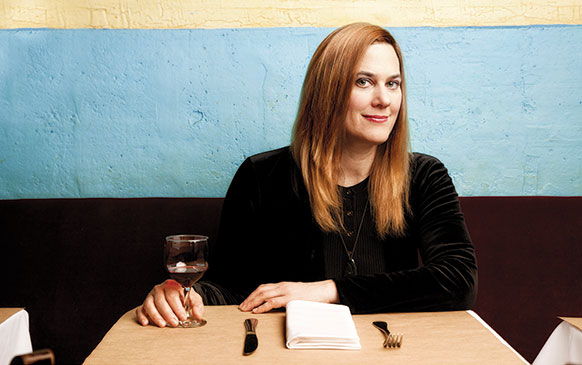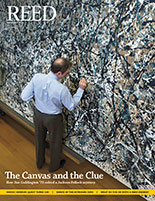
IRIS login | Reed College home Volume 92, No. 3: September 2013
Reediana
Blue Plate Special: An Autobiography of My Appetites (Doubleday, 2013)

Photo by Michael Sharkey
Kate Christensen ’86
By Angie Jabine ’79
“The company of other people, the vicissitudes of romantic relationships, or just being out in the world, have often made me feel anxious, uncomfortable, judged, shy, or misunderstood, and fundamentally unconnected to myself, the truest cause of loneliness,” writes novelist Kate Christensen in her new memoir. “Eating a good meal, like reading a satisfying novel, has returned me to myself during times when this disconnect was a profound internal chasm.”
And so she hangs this account of her life on a generous framework of food. The oldest daughter of a cello-playing Swiss-German refugee mother and a Marxist lawyer father, she spent her early childhood in the granola-laced Berkeley counterculture, until her father’s bouts of wife beating precipitated a divorce. Her mother moved the family to Arizona, where she scrimped her way through grad school and served up “blue plate specials”—cheap, hearty meatloaf or frozen fish fillets—to her three growing daughters. This being the 1970s, the girls seldom ate anything more exotic than the occasional TV dinner, SweeTarts, or Snickers bars.

It was a stint as a nanny and cook in France that introduced Kate to more sophisticated fare. Encountering her first soufflés, mousses, crème fraîche, and lapin à la cocotte at the height of her adolescent body consciousness led to a feast-or-famine scenario that will be depressingly familiar to many female readers: gorging on rich food, then starving herself until her jeans hung loose on her hips again. As an English major at Reed, she stared dubiously at the dreadlocked “trust fund kids” scrounging off the trays in commons, and her sense of food “became bifurcated. I ate little, but I thought about it a lot.”
She attended the Iowa Writers’ Workshop on the strength of the short stories she wrote at Reed. At age 27 she moved to New York City, where she lived and ate for two years before ever sitting down to a nice meal in a good restaurant. “If I had known that my first novel wouldn’t be published for another 10 years,” she notes, “I might have jumped out the window.” But the novels—sharp, satirical, not-quite-comedies of manners—did get written and published, six of them to date. Her highly acclaimed novel, The Great Man, practically defines its characters by their palates: the gallery owner who regales his dinner guests with tiny “Japanese woodcut” salads of pale green frisée and cerise-rimmed radish slices; the asocial artist who “would have been perfectly happy with a wedge of iceberg with a glob of bottled Russian dressing.”
Today Kate lives and eats in one of America’s best food towns, Portland, Maine, and more food-related books are in the works. The family schisms, tormented romances, and tearful restaurant scenes that she chronicles in Blue Plate Special arguably come across more entertainingly when enlivened with dialogue and transmuted into fiction, especially in The Great Man and her latest novel, The Astral. But aspiring novelists will surely appreciate her honesty, and anyone whose imagination is sparked by food will appreciate her recipes, from the tapioca pudding of toddlerhood to the “dark night of the soul” soup of middle age.

LATEST COMMENTS
steve-jobs-1976 I knew Steve Jobs when he was on the second floor of Quincy. (Fall...
Utnapishtim - 2 weeks ago
Prof. Mason Drukman [political science 1964–70] This is gold, pure gold. God bless, Prof. Drukman.
puredog - 1 month ago
virginia-davis-1965 Such a good friend & compatriot in the day of Satyricon...
czarchasm - 4 months ago
John Peara Baba 1990 John died of a broken heart from losing his mom and then his...
kodachrome - 7 months ago
Carol Sawyer 1962 Who wrote this obit? I'm writing something about Carol Sawyer...
MsLaurie Pepper - 8 months ago
William W. Wissman MAT 1969 ...and THREE sisters. Sabra, the oldest, Mary, the middle, and...
riclf - 10 months ago